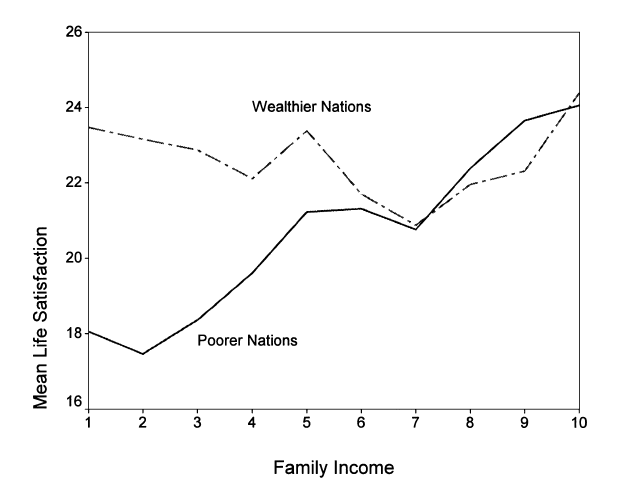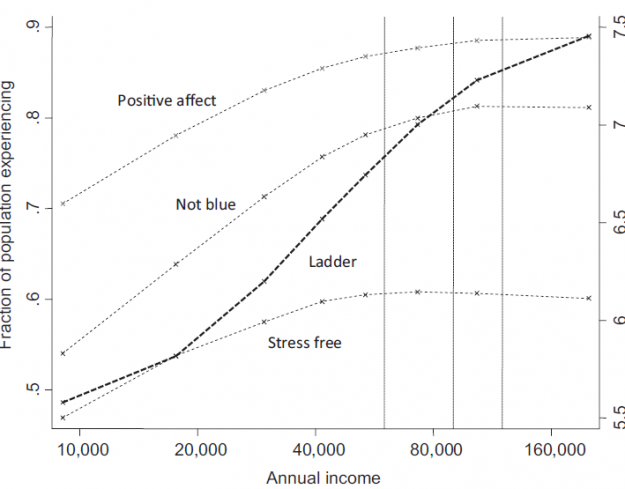Does Money Make You Happy?

What do students think:
Does money buy happiness? In a big American freshmen study conducted in 2015, freshmen from all around America were asked to decide what the most important things in their lives are. They had to select from several pre-defined answers. As you might suspect, the answer which was chosen the most by the participants was: “Being well off financially” with 81.9%. Good finances were chosen more often than “raising a family” or “helping others who are in difficulty”. Additionally, only 46.5% selected the answer “developing a meaningful philosophy on life”. Money seems to be the dominant goal for students nowadays (at least for American students). But is chasing money the way to go when looking for happiness?
Research:
To answer this question let’s look at research conducted on this subject:
In a study by Ed Diener and Eunkook M. Suh they looked at several different rich and poor countries and studied the connection between life satisfaction and income. They found a small mean correlation of 0.1 to 0.13. This indicates that a higher income seems to raise life satisfaction but only by a small amount. You can’t reliably predict someone’s life satisfaction based on their income with the found correlation.
In the same study, they also looked at the life satisfaction of college students and the income of their families across poor and rich nations. In the following graph, you can see how the students’ life satisfaction and their families income relate to one another. 9 rich and 9 poor nations are included.
For poorer nations, life satisfaction tends to go up with more income. But for the wealthier nations, life satisfaction stays the same and even drops off a bit with more income. One reason for those findings could be that students in poor countries with low income don’t have their basic needs met and have therefore a lower life satisfaction. The more income they have the more needs are fulfilled. The students in the wealthy nations already have all their basic needs met and therefore don’t experience a big increase in happiness.
Another study, conducted by Daniel Kahneman and Angus Deaton shows the influence high income has on emotional wellbeing and one’s evaluation of life. The results indicate that higher-income improves life evaluation. When participants were asked to rate their life on a scale of 1 to 10, they rated their lives more highly when they had a higher income. Emotional well-being on the other hand does not seem to rise much with more income and stagnates fast. The following graph demonstrates the findings.
“Positive affect”, “Not blue” and “Stress-free” are indicators for emotional wellbeing. “Positive affect” for example represents how much one smiles throughout the day. “Not blue” means to what extent one is free from negative emotions like worries and anxieties. The three measures go up slightly with more income but stagnate at around 75000$ of annual income. Based on these findings the authors estimate that raises in your annual income stop contributing to your emotional wellbeing at the 75000$ mark. One suggestion by the authors to explain these findings is that once you reach an income of 75000$ you got everything important to you covered. You can live your life as you want, spend time with the people you like and avoid pain. More money does not seem to add much in terms of happiness.
The “Ladder” graph shows the evaluation of life. People seem to rate their lives more highly the more they earn. Based on these results people tend to think better of their lives the more income they have even though their emotional wellbeing does not increase by much.
Another interesting study by Ed Diener, Jeff Horwitz and Robert A. Emmons compared the happiness level of a sample from the forbs 100 List (very wealthy people) with normal people. They found that on average the wealthy group was happier than the not wealthy group. The interesting thing was, the actual difference between the two groups was not high. 37% of people in the wealthy group were less happy than the average guy from the non-wealthy group. Even under the very rich, there are unhappy people. Money doesn’t seem to be an important factor for happiness based on these results. Other factors could have a greater contribution to happiness. The extent to which one can actualize himself, experience a flow state at work or suffer under external stresses might be more important than money.
Materialism:
We just looked at how money contributes to our happiness. Now let’s see what consequences the pursuit of money and materialistic goods has on our happiness.
Marsha L. Richins and Scott Dawson conducted a study on materialism to better understand its consequences. They first found that materialists value money or means to acquire in general quite high compared to non-materialists. Also, they found materialists to be very self-centred and reluctant to share their money and material possessions even with people to whom they have close social ties like family and friends.
Furthermore, the authors looked at the influence of materialism on life satisfaction. They studied the following factors: Satisfaction with life as a whole, with the amount of fun, with family life, with income or standard of living and with relationships with friends. All of these factors were negatively influenced when people held materialistic values. The strongest negative effect materialism had, was on satisfaction with income or standard of living.
Additionally, the results show that materialistic values have a relatively high correlation with envy. The more materialistic one is the more he feels resentment for others who have more and also dissatisfaction with his own life.
Conclusion:
Money does have a small and positive impact on emotional wellbeing which tends to plateau at around 75000$ of annual income. It seems like the more needs are met, the more money loses its influence on wellbeing. On the other hand, more money does seem to positively influence the way we think about our lives objectively. We can also say that wealth does not guarantee happiness as there is only a small difference between the average happiness level of wealthy and normal people. Possibilities for self-actualization and flow might be more important for achieving happiness in one’s life. Furthermore having materialistic values and pursuing money above all else can lead to a lot of dissatisfaction in life and increase negative emotions like envy.
I hope you learned something in this post. More content is coming and will focus on the things that actually make you happy. 🙂

